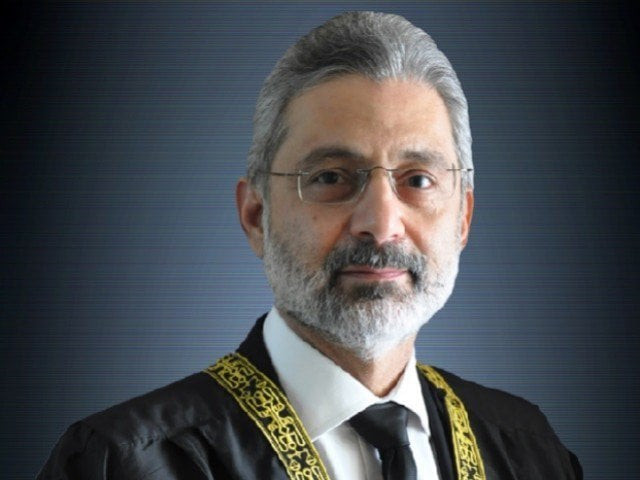Presidential probe undermines judiciary’s freedom: SC judge
SCBA counsel presents arguments against presidential reference against Justice Isa

Justice Qazi Faez Isa. PHOTO: FILE
Justice Akhtar – a part of the ten-judge full court hearing a slew of petitions against a presidential reference that seeks removal of an SC judge Qazi Faez Isa – made this observation on Tuesday during hearing of the case.
The reference filed in June alleged that Justice Isa acquired three properties in London on lease in the name of his wife and children between 2011 and 2015, but did not disclose them in wealth returns.
The Supreme Judicial Council (SJC), the constitutional forum that can hold a judge accountable, later issued showcase notices to the judge on basis of the reference. A number of petitioners, including Justice Isa, later challenged the reference in the apex court.
Justice Munib Akhtar also asked if the president could refer a reference to the Supreme Court directly. Justice Sajjad Ali Shah also asked as to how it was possible that two different inquiries are conducted into the same matter.
Earlier, Advocate Hamid Khan appeared before the court on behalf of Supreme Court Bar Association, Balochistan and Quetta bar associations that have filed petitions against the presidential reference.
He said his arguments would be different from Muneer A Malik, Justice Isa’s counsel, as he would argue over structural matters. There were reservations on three matters and independence of judiciary was his priority, he added.
Justice Mansoor Ali Shah asked the counsel about plea in the petitions. Khan responded that his plea was like the plea filed by Muneer A Malik.
He said the reference was based on mala fide intentions as legal formalities were not fulfilled before filing of reference. He pleaded the court to dismiss reference by declaring it mala fide.
Supreme Court could soon have women judges: CJP
Khan said Article 209 was included first time in the 1962 Constitution. “The Article 209 was not properly changed in the 1973 Constitution.”
He said according to 1973 Constitution, the president can only establish his opinion in Article 209 but after the 17th amendment in the Constitution, the SJC could also frame its opinion. He said the Article 209 did not allow the SJC to frame rules.
Hamid Khan said the Constitution's scheme made it clear that the president was the head of the all the pillars of the state. He said the Article 50 of the Constitution clearly says the Parliament consisted of two houses – the Senate and the National Assembly – and President was part of it.
Article 256 states that the President addresses both houses of the Parliament, he added.
Khan said Article 58 mandated the President to dissolve the assembly. In Article 58(1) president dissolve assembly on recommendations of the prime minister, he added.
The Supreme Court later adjourned hearing of the case till Wednesday (today).



















COMMENTS
Comments are moderated and generally will be posted if they are on-topic and not abusive.
For more information, please see our Comments FAQ